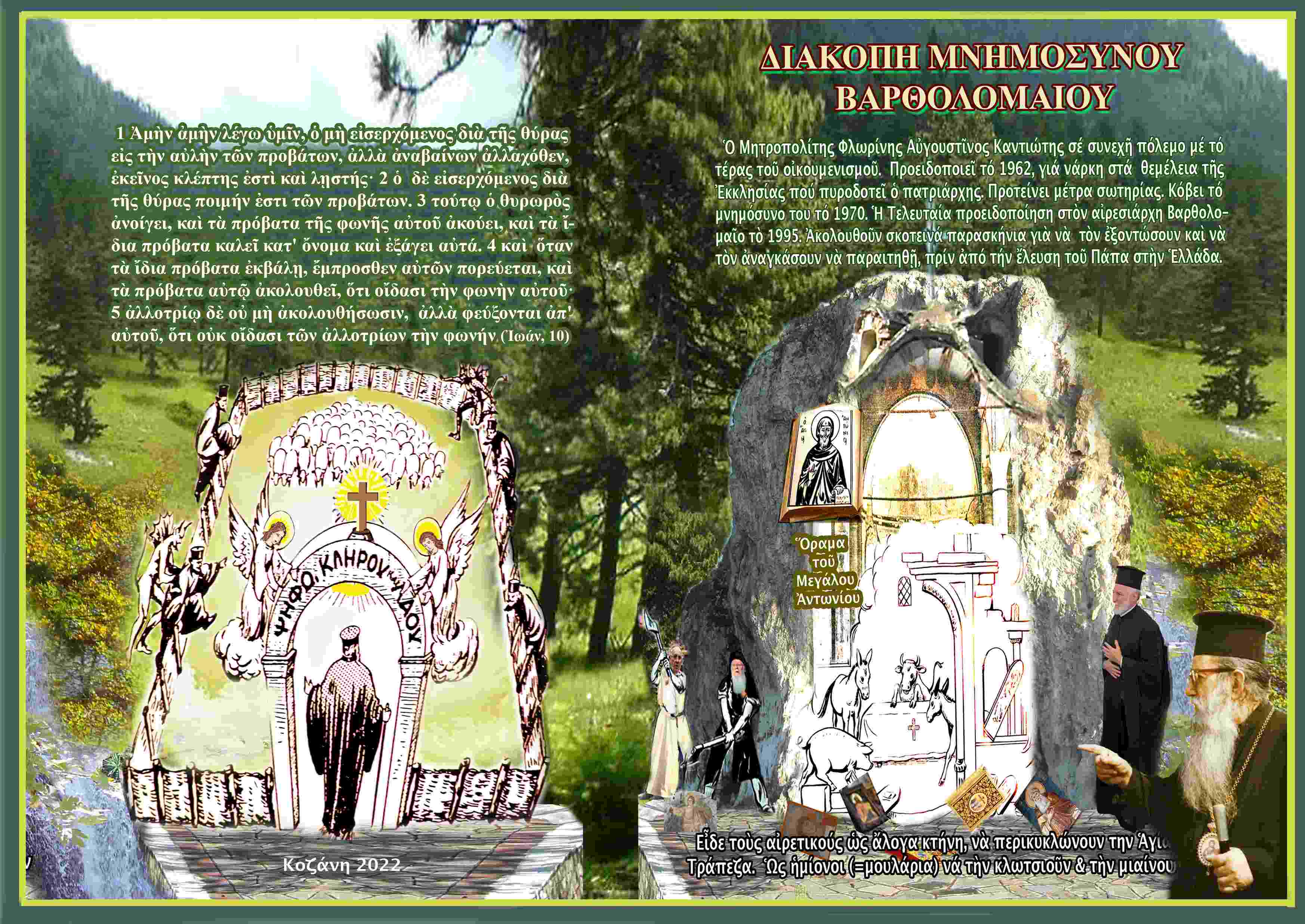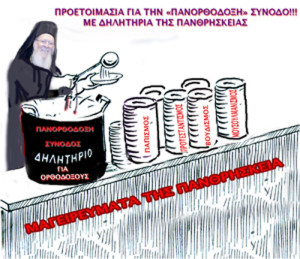ΟΙΚΟΥΜΕΝΙΣΜΟΣ – ΣΥΝΤΕΛΕΙΤΑΙ ΠΡΟΔΟΣΙΑ _ Ecumenism – Betrayal Is Being Committed (O MHTΡΟΠΟΛΙΤΗΣ ΦΛΩΡΙΝΗΣ ΑΥΓΟΥΣΤΙΝΟΣ ΚΑΝΤΙΩΤΗΣ MAΣ ΣΥΜΒΟΥΛΕΥΕΙ ΝΑ ΕΙΜΕΘΑ ΕΠΙΦΥΛΑΚΗ)
 Ιούν 23rd, 2016 |
Ιούν 23rd, 2016 |  Filed under: «ΠΡΟΔΟΣΙΑ ΟΡΘΟΔΟΞΟΥ ΠΙΣΤΕΩΣ»
Filed under: «ΠΡΟΔΟΣΙΑ ΟΡΘΟΔΟΞΟΥ ΠΙΣΤΕΩΣ»
ΔΙΑΒΑΣΤΕ ΤΟ ΚΗΡΥΓΜΑ ΣΤΑ ΕΛΛΗΝΙΚΑ, ΣΕ .pdf
ΟΙΚΟΥΜΕΝΙΣΜΟΣ – ΣΥΝΤΕΛΕΙΤΑΙ ΠΡΟΔΟΣΙΑ
Kyriaki – Sunday Sermonette
Issue No. 1724
Ecumenism – Betrayal Is Being Committed
Today (Feb. 6th), my beloved, our holy Eastern Church celebrates the anniversary of the departure to the Lord of sacred Photios, patriarch of Constantinople (A.D. 820-893).
They have said, that history is a blackboard, on which time sets up various icons of great figures. And in Christian history there are great figures, which contributed to the dissemination and establishment of our holy faith. After the spotless icon of our Lord Jesus Christ there are other figures. From the perspective of struggles for the preservation of the heritage of Orthodoxy, struggles for the gospel (evangelio) to be held pure, three figures stand out: first, the Apostle Paul, second, Athanasios the Great, and third, today’s saint.
The apostle Paul struggled against the tendency of Judaic circles to adulterate Christianity so that it might be made to appear an offshoot of Judaism. He offered resistance towards them but also to the apostle Peter, who had of course the same mind-set with the apostle Paul but as regards this point he appeared briefly somewhat retreating. Paul declared, that in the new faith, the faith of grace, the forms or types no longer are in force; the sacrifices and circumcision, but a “new creation” (Gal. 6:15). To Paul we owe the separation of Christianity from Judaism and the self-completelness of our Christian Church.
Athanasios the Great struggled against the tendencies of greek philosophy, that is, against those who wanted to say that, just as the ancients had demi-gods, thus in the new faith Christ is a kind of demi-god, who can never reach God the Father. Against this tendency he held that our Lord Jesus Christ is one of the three persons of the thrice-sunned Divinity, of the holy Trinity.
And sacred Photios, whom we celebrated today, struggled much in another most important struggle, against the interference of the state in the church; he supported that which the Lord said: “Render unto Caesar what is Ceasar’s unto God what is God’s” (Matt. 22:21). He struggled against the tendency of papism to subject Orthodoxy under its authority. He struggled against the primacy of the pope, who then made his appearance with ambitions over the Eastern Church. He struggled, primarily, – and this is what is most important – against innovations, which came to dilute the content of the orthodox faith, against the “atheist” addition in the Symbol of Faith of the so-called Filioque, by which the triadic dogma is abolished, the holiest and most mystical dogma of our faith. And the three of them underwent many trials for their struggles.
***
Sacred Photios underwent many sorrows. He was slandered by malicious people of his time; they presented him as being dominated by the controlling spirit, a disposition to take over the throne, while it is a fact he refused the sacred office and the night before his election with tears he begged to avoid the cup of this tribulation. He was insulted even by the papists, which insults continue until today; and even only his name infuriates them. He was persecuted by emperors and other rulers of his time. He was sent into exile twice; in this regard, too, he was a worthy imitator Great Athanasios.
And his end was heroic. He was jailed in a monastery, and there relentless enemies forced upon him, who was one of the most studious persons, the worst kind of punishment; and that was the deprivation not of food or water or air, but that which for him, from his young years until the end of his life, were his breath; they deprived him of sacred books. No one else loved books and study, both external wisdom and divine Scripture, as much as sacred Photios. At the age of 20 he wrote the most important Lexicon, which God willed to be discovered in our days in the sacred monastery of Zabordas (Grevena), that famous codex, whose publication evokes global scientific interest; because until recently it was unknown, only a few pages of it was known. To him then, who loved books so much, was enforced as punishment not to have any book near him. And he remained without books, his beloved “friends”.
***
Sacred Photios became distinguished, as today’s church service says, as a “first-line fighter”, a front-line fighter whom God set up in order that the papal wave may not roll over the East; he was shown to be an “acropolis”, a fortress of Orthodoxy; he was the “light of the East”, the “beauty of the fathers” of the Church. Today we celebrate the memory of such a man, my beloved. Naturally, in these few words which we are saying about him, it is not possible to exhaust the vast issue of sacred Photios. We are limited to touching only upon the following significant aspect.
We are celebrating his memory today. We are celebrating in a time during which much talk is taking place concerning the ecumenical movement and the union of the “churches”; in a time when for the first time – I consider this to be “a sign of the times” (Matt. 16:3) – orthodox rulers are going to Rome and are bowing before the pope! The sacred bones are turning in the grave seeing hierarchs and other clerics and theologians passing by Rome and embracing the pope, seeing so many attempts being made for “reconciliation” of East and West, and for conventions upon conventions taking place; which according to my humble apprehension are traps, into which they are trying to drag the Orthodox Church.
In some such time the name of sacred Photios is not liked; they are seeking to forget him, because they consider his remembrance harmful to the union of the “churches”. But we, the children the orthodox faith, as many of us who still feel inside our souls a spark of love, of the great and fiery love which sacred Photios felt towards the Church, for which he lived and breathed and sacrificed and died in exile, deprived of all – I say – we the children of Orthodoxy, must in this epoch show ourselves to be worthy our Orthodox faith.
First and foremost, caution is needed; let us not pay much mind to whatever is said about union. If the union ever takes place, it will happen not through the subjection of Orthodoxy to the orders of the pope and to the eccentricities of the protestants; if ever the time of union comes – and would that comes – it will come through the return of all to the ancient beauty of our Orthodoxy.
Let us therefore be on guard. We are living in days when the betrayal of our orthodox faith is being committed within the bosoms of our Church Herself on the part of bishops preachers and theologians, those who ought to have been the first guards of the sacred heritage and deposit of faith. And if there comes the need for harsher struggles – for now simply they are preambles of such a conflict and we don’t know what God has in store – may the Lord raise up new strugglers of the Orthodox faith. May each one of us, and especially the younger ones, become small Athanasioses, small Photioses, small Mark Eugenikoes, ready to raise high the flag and the banner of our Orthodox faith. This I think will be the best memorial for today’s celebrated saint, who rejoices and is glad in the heavens when he sees that the contingent of the orthodox is not deprived of fighters, not deprived of men, not deprived of heroes, not deprived of people who are ready to sacrifice their time, their youth and everything in behalf of Orthodoxy, for which sacred Photios lived and died.
Through the intercessions of saint Photios, as well as saint Boukolou, who celebrates together with him today, and all of the martyrs, may our Lord have mercy and save all of us; amen.
+ bishop Augustinos



Add A Comment
You must be logged in to post a comment.